Alan Taylor
A Book Of One’s Own
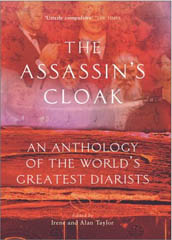 A diary is like drink,’ wrote the Scottish poet, William Soutar, ‘we tend to indulge in it over often: it becomes a habit which would ever seduce us to say more than we ought to say and more than we have the experimental qualifications to state.’ Soutar, bedridden with a wasting illness, it must be said was a special case. Trapped from a young age in a small room in his parents’ house in Perth, his view of the world circumscribed by the size of his window, he was, in effect, a prisoner. His diary was his constant companion, a visitor who never went away. Thus the temptation to over-indulge.
A diary is like drink,’ wrote the Scottish poet, William Soutar, ‘we tend to indulge in it over often: it becomes a habit which would ever seduce us to say more than we ought to say and more than we have the experimental qualifications to state.’ Soutar, bedridden with a wasting illness, it must be said was a special case. Trapped from a young age in a small room in his parents’ house in Perth, his view of the world circumscribed by the size of his window, he was, in effect, a prisoner. His diary was his constant companion, a visitor who never went away. Thus the temptation to over-indulge.
For many people, however, a diary is like a reproach, a perpetual reminder of our indiscipline, lack of application, weakness of resolve. How many diaries, started in the first flush of a new year, peter out even before the memory of the annual hangover? We open the pristine book with enthusiasm but after a few days what had been a torrent turns into a drip. Soon, whole weeks go by unremarked, blank page followed by blank page. Humdrum life intrudes and the compulsion to memorialise in print evaporates. There is nothing quite as capable of inducing guilt as an empty diary.
Soutar, his life cruelly condensed, came to depend on his diary. It was his friend, crutch, confidant, shrink, father confessor, mirror of himself, for a diary is the most flexible and intimate of literary forms. As Thomas Mallon noted in his formative book on the subject, A Book of One’s Own: People and their Diaries, diaries have been kept by everyone, from the barely literate to the leaders of men and women, from serial killers to conmen, kitchen maids to all-conquering heroes, children and nonagenarians, tinkers, tailors, soldiers and spies.
‘Some,’ writes Mallon, ‘are chroniclers of the everyday. Others have kept their books only in special times – over the course of a trip, or during a crisis. Some have used them to record journeys of the soul, plan the art of the future, confess the sins of the flesh, lecture the world from beyond the grave. And some of them, prisoners and invalids, have used them not so much to record lives as create them, their diaries being the only world in which they could fully live.’
Into the latter category falls William Soutar who but for his diary and a few verses in Scots for children – ‘bairnrhymes’ – would now be forgotten. Though he began keeping a diary in 1917, when he was nineteen years-old and serving in the Atlantic with the Navy, it comprised little more than brief notes of appointments and books read.
His diary took on a fresh complexion, however, after February, 1929, when he fell ill with pneumonia. Confined to bed, his right leg became increasingly disabled. In hindsight, the prescribed treatment seems mediaeval; weights were put on the leg to counteract muscle contraction. When this failed, the only hope was surgery. In May 1930, he was operated on unsuccessfully but the stoical, philosophical Soutar gives little indication of despair, of the hopelessness of his plight. Unlike many other diarists who are consumed with themselves, egocentrics who seem to live only inside their own heads and are obsessed with their own troubles, Soutar managed to transcend the self, and enter an elevated state of being. Just a month before he died in October 1943, he wrote:
There is a quirkiness about a diary which cannot be assessed: something which may seem to the diarist himself to be of real importance may in later days prove to be a bore; and some little aside or comment which has just dropped from his pen, by the way, may prove to be the most penetrating glimpse of a situation, or a revolutionary flash lighting up some strange corner of the spirit. The true diary is one, therefore, in which the diarist is, in the main, communing with himself, conversing openly and without pose, so that trifles will not be absent, nor the intimate and little confessions and resolutions which, if voiced at all, must be voiced in such a private confessional as this.
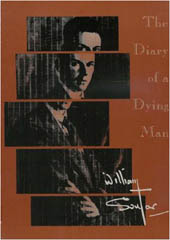 This is one definition of a diary but there are countless others that are equally valid. The elasticity of the form is a large part of its appeal, which is perhaps why it is so difficult to pin down. When, truly, is a diary a diary? What is the difference between a diary and journal or, for that matter, a log or a notebook? Dictionary definitions are not much help. The New Shorter Oxford English Dictionary, for example, says a diary is ‘a daily record of events, transactions, thoughts, etc., esp. ones involving the writer.’ A journal, on the other hand, is defined thus: ‘A personal record of events or matters of interest, written up every day or as events occur, usu. in more detail than in a diary.’
This is one definition of a diary but there are countless others that are equally valid. The elasticity of the form is a large part of its appeal, which is perhaps why it is so difficult to pin down. When, truly, is a diary a diary? What is the difference between a diary and journal or, for that matter, a log or a notebook? Dictionary definitions are not much help. The New Shorter Oxford English Dictionary, for example, says a diary is ‘a daily record of events, transactions, thoughts, etc., esp. ones involving the writer.’ A journal, on the other hand, is defined thus: ‘A personal record of events or matters of interest, written up every day or as events occur, usu. in more detail than in a diary.’
It is a fine distinction and one which individual writers seem blithely to ignore. In his Devil’s Dictionary, for instance, Ambrose Bierce wrote: ‘Diary. A daily record of that part of one’s life which he can relate to himself without blushing.’ Oscar Wilde, however, went a step further. ‘I never travel without my diary,’ he had Gwendoline in The Importance of Being Earnest say, ‘One should always have something sensational to read in the train.’
More often than not, writers question why they did or did not keep a diary. ‘Why do I keep this voluminous journal?’ asked Rev. Francis Kilvert. ‘I can hardly tell.’ Sir Walter Scott deemed not keeping a regular diary one of the regrets of his life. But perhaps one of the most curious and imperceptive comments on diary keeping came from A.A. Milne when he remarked in 1919, ‘I suppose this is the reason why diaries are so rarely kept nowadays – that nothing ever happens to anybody.’
The idea that diaries are only worth keeping when great events are in train is barely worthy of examination. The human condition is such that there is always something happening somewhere, whether personally or politically, parochially or on the international stage. The most durable diarists have not always been those who mix in high society or are connected with the great and the good and have the opportunity to peek through the keyhole as momentous events unfold. The best diaries are those in which the voice of the individual comes through untainted by self-censorship or a desire to please. First, and foremost, the diarist must write for himself; those who do not, who are already looking towards publication and public recognition, invariably strike a phoney note. As Alan Clark, author of the most notorious twentieth century fin de siècle diaries, has said: ‘Sometimes lacking in charity; often trivial; occasionally lewd; cloyingly sentimental, repetitious, whingeing and imperfectly formed. For some readers the entries may seem to be all of these things. But they are real diaries.’ The first real diarist was Samuel Pepys. In the popular imagination a typical entry by Pepys opens with ‘Up betimes’ and closes ‘And so to bed.’ In fact, his diary is much less formulaic than is supposed though there is an admirable, unaffected directness to his approach, seizing the day with uncommon zest. Born in London on 23 February, 1633, he was one of eleven children. His father was a tailor; his mother had been a domestic servant. From such humble beginnings Pepys rose precipitously in the world, which may account for his frequent compulsive and unabashed bouts of stocktaking. He is, even if he says so himself, ‘a very rising man’. 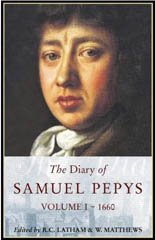
Pepys’ naive enthusiasm for self-reckoning has been echoed by diarists down the decades, be they writers counting the words they have produced or moneys they have made. Arnold Bennett, for example, made it a New Year’s Eve ritual. Such record keeping is a valuable function of diaries but were they simply to consist of inventories they would be – as Robert Louis Stevenson said of books – ‘a mighty bloodless substitute for life.’ Life, unvarnished and uncensored, is what makes Pepys’ diary such a constant source of wonder. In every entry, he reveals something of his true self. Like Boswell in the eighteenth century and Alan Clark in the twentieth, he was comically candid about the attractions of women, which he was not always able to resist. His diaries are perhaps at their most piquant when he describes close encounters of a sexual nature, not all of which were consummated. His delight in this adulterous act is as charming as his disquiet at the vice at the royal court of ‘drinking, swearing and loose amours.’ Pepys is a mass of contradictions which serves only to endear him to us further. Nowhere is this more apparent than in his relationship with his wife, Elizabeth, who from her first appearance in his diary (when she burns her hand dressing the remains of a turkey) to almost her last (when she is troubled with tooth-ache), is the perfect foil for his waywardness and vanity. They were married in 1655, when he was twenty-two and she was just fifteen. So hard up were they that he had to pawn his lute for forty shillings. The route out of penury came through Sir Edward Montagu, later created Earl of Sandwich, who married an aunt of Pepys’ father. A close personal friend of Oliver Cromwell, Montagu was Pepys’ mentor and secured his appointment in the Navy Office. From ‘clerk of the King’s ships’, Pepys – a diligent bureaucrat and ardent in stamping out corruption – rose to become secretary to the Admiralty.
In many ways, it is the ideal kind of post for a diarist. Though not hugely powerful himself he nevertheless had access to those charged with running the country. In that regard, Pepys is the predecessor of diarists like Harold Nicolson, whose career as a journalist and politician gave him a unique glimpse of Britain in the 1930s, including the rise of fascism, the influence of the Bloomsbury group and the Abdication crisis, and Sir Henry Channon, a charmer from Chicago who made a rapid rise in English society between the two world wars.
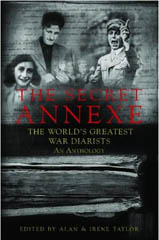 Channon was in no doubt that his diaries would one day be made available for public consumption. ‘I sometimes wonder,’ he wrote in November 1936, ‘why I keep a diary at all. Is it to relieve my feelings? Console my old age? or to dazzle my descendants?’
Channon was in no doubt that his diaries would one day be made available for public consumption. ‘I sometimes wonder,’ he wrote in November 1936, ‘why I keep a diary at all. Is it to relieve my feelings? Console my old age? or to dazzle my descendants?’
Some fifteen years later he added, ‘I feel that some day they may see the light of day and perhaps shock or divert posterity a little.’ With that in mind he deposited his diaries in the British Museum with the initial instruction that they should not be consulted or published until fifty years after his death. But in the last year of his life he had a change of heart, and he began to edit them himself.
Channons’ ambivalence is echoed by many other diarists, not least the great Pepys who laboured over his diary in the wee small hours with the light weak and his eye-sight failing. He began writing his diary on an auspicious date, the beginning of a new year and a new decade, 1 January, 1660, and continued for almost ten years, bringing it to a reluctant close on 31 May, 1669, believing that he was about to go blind. Ironically, Pepys did not go blind and lived for another thirty-four years. His diary, his lasting memorial, which was written in shorthand, he had bound in leather in six volumes, not the act of a man who did not want to see them preserved. With the rest of his library, they were deposited at Magdalene College, Cambridge, where they lay undeciphered until 1825. In the opinion of O.F. Morshead, editor of a very popular but heavily censored edition of the diaries, the impetus to break the code may have been prompted by the publication in 1818 of the diaries of Pepys’ contemporary, John Evelyn. It is a tradition at Magdalene that Lord Grenville took one of the volumes to bed and by morning had worked out how to translate it. The entire diary was then handed over to John Smith, an undergraduate, who made a complete transcription. Working twelve hours a day, it took him more than three years to make a complete transcription of in excess of three thousand pages. It was, said Smith, ‘very trying and injurious indeed to the visual organs.’
In contrast to Pepys, John Evelyn was altogether more reserved and puritanical but while his diary pales in comparison with his more famous contemporary it has its own idiosyncratic appeal. Evelyn came from a family which had made its fortune in gunpowder and he was well enough off to live independently, travelling extensively around Europe, which he recorded colourfully. His diary begins, precociously, in 1620, when he was born, and from the first he seemed to possess uncanny powers of description. His mother, he recalls, was ‘of proper personage, well timber’d, of a browne complexion; her eyes and haire of a lovely black; of a constitution more inclyn’d to a religious Melancholy, or pious sadnesse; of a rare memory, and most exemplary life; for Oeconomiq pridence esteemed’d one of the most conspicuous in her Country.’
Its final entry (‘The Raine and a taw upon a deepe Snow, hindred me from going to Church.’) was made in January 1706 in the reign of Queen Anne and the year of Evelyn’s death at the age of eighty-five. But assiduous though Evelyn was in keeping his diary, it was meant for his eyes only. No publication was ever intended and it only came to light through pure fluke in 1813 when Lady Evelyn, the widow of the diarist’s great-great-grandson, mentioned them to William Upcott, a librarian and bibliophile.
The successful publication of Pepys’ and Evelyn’s diaries in the nineteenth century undoubtedly proved a spur to others to follow in their tracks. A diary, at least to begin with, is not a daunting prospect, like an epic poem, say, or a play or a novel. There is no imperative to publish or show anyone how it is progressing. You don’t need to do any research or check facts. Entries can be long or short, factual or inaccurate, real or imagined. Though diarists, invariably, attempt to keep up a daily routine they just as invariably fail. Life has its insidious way of interrupting the flow. Some diarists take this in their stride while it throws others into a spin, as if they had forgotten to turn up for a dinner or missed a job interview.
Some diarists, such as Walter Scott, write during times of emotion and financial crisis, others when they are at their most happy and socially active. Evelyn Waugh, one of the greatest twentieth century diarists, kept a diary for diverse reasons, wrote the editor of his diaries, Michael Davie, as an aide-memoire and as a source of material for his novels and autobiography. ‘Fading memory and a senile itch to write to the Times on all topics have determined me to keep irregular notes of what passes through my mind,’ he wrote in 1960, when he started his diary again after a break of some four years. Waugh, in common with most diarists, wrote with no intention of seeing his diary in the public domain and died before the decision was taken to publish it. He wrote privately and did not tell many of his friends that he kept a diary.
Even his wife did not know he was keeping one. Though not by nature furtive, he seemed to want to keep his diaries to himself. Why no one knows. In contrast, the artist Andy Warhol liked to dictate his diary to an amanuensis. Perhaps because of the way they were composed Warhol’s diaries read like an extended gossip column.
Would one be so interested in Warhol’s diaries if they did not contain the litany of rock stars, actors and artists, designers and writers? Perhaps not. But each diarist is an individual describing his or her life, for which they need make no excuses. As Kilvert indicated, curiosity is not the least of the attractions of reading a diary. Until the present age, when it is possible if one is so inclined to view every moment of complete strangers’ lives via the Internet, a diary was the closest one could get to understanding the way people lived and thought. Reading Kilvert, for example, is to get inside the mind of a nineteenth century English country parson. His diary runs from 1870-99, almost the same span as Pepys’, but it only came to light in 1937 when William Plomer, the poet, novelist and critic, received twenty-two notebooks. His selection from these was published between 1938 and 1940. 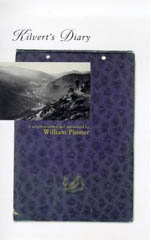
So far, so straightforward. But Plomer, avowedly because he was pressed for space, destroyed the typed manuscript he had made of the notebooks, convinced that the originals would be preserved. But they were not and out of the original twenty -two notebooks only two now survive. We know, too, that Kilvert’s wife, to whom he was married only a matter of months before he died, destroyed others of his diaries. It is a very odd case and raises more questions than can be answered. What is particularly controversial, however, is Plomer’s assertion that he had retained everything of the diaries which were worth preserving. ‘I can assure you,’ he wrote is his selection, ‘that the best and most essential parts of the Diary are in print. I left out what seemed to me commonplace and trivial.’
It is hard to see Plomer’s action as other than arrogance. Without the commonplace and the trivial the best diaries would be bereft of much that makes them so compelling and enduringly fascinating. Looking back over the diaries of the Rev. James Woodforde or Dorothy Wordsworth or even Josef Goebbels it is that which many people might not deem worth recording which sheds the most brilliant light on the diarist’s character or illuminates the times in which they lived. Often, one is struck by the ability of great diarists to combine in a single entry news either momentous or terrifying, or both, with some minor observation or irritation of everyday life. It is in a diary that our private world imperceptibly merges with the cataclysmic events which make headlines in every language.
But one keeps coming back to William Soutar, lying on his back in bed as his health evaporates. His diary is an inspiration; it may be the work of a dying man but he is living for the moment. Soutar sagely realised better than most the ambiguous potential of a diary, imbued as it inevitably is with secrecy, and all it implies. A diary may be like drink, but it is also only as reliable as the diarist, who may be honest or corrupt or deceitful or a self-delusionist. Not only can it can it persuade us to betray the self, wrote Soutar, ‘it tempts us to betray our fellows also, becoming thereby an alter ego sharing with us the denigrations which we would be ashamed of voicing aloud; a diary is an assassin’s cloak which we wear when we stab a comrade in the back with a pen. And here is the diary proving its culpability to its own harm – for how much on this page is true to the others?’
© Alan Taylor

Comments